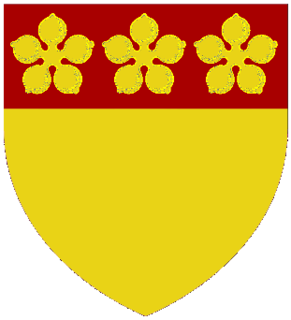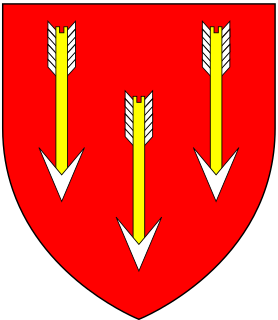External links
- Attribution
![]() This article incorporates text from a publication now in the public domain : Stephen, Leslie, ed. (1885). "Bernard, John (d.1567?)". Dictionary of National Biography . Vol. 4. London: Smith, Elder & Co.
This article incorporates text from a publication now in the public domain : Stephen, Leslie, ed. (1885). "Bernard, John (d.1567?)". Dictionary of National Biography . Vol. 4. London: Smith, Elder & Co.
John Bernard (died 1554) was an English academic and religious author. He is known for a Latin devotional work Oratio Pia that was published some 14 years after his death, and then translated into English. [1]
Bernard was from Yorkshire, and is thought to have been from the West Riding. He was a student at Queens' College, Cambridge, where he was a scholar in 1541. He proceeded B.A. in 1543–4. He became Trotter's priest there about 1544, and a Fellow shortly afterwards that year. He commenced M.A. in 1547. [1] [2]
Bernard was bursar of his college from 1550 to 1552. At the beginning of the reign of Mary I of England, he retained his fellowship, he retained his fellowship, despite reforming and evangelical Protestant views, and that year was licensed to preach. He died in 1554. [1]
Bernard composed Oratio pia, religiosa, et solatii plena, de vera animi tranquillitate. It was found in the author's study, after his death, and published at London, 1568, with a dedication to the courtier Peter Osborne, by his brother Thomas Bernard who edited the work. A translation into English, by Anthony Marten, was published under the title of The Tranquillitie of the mind: an excellent Oration directing every man and woman to the true tranquillity and quietness of the minde, London, 1570. [3]
The book is considered an example of the Protestant belles lettres of the period, comparable with works of the Huguenot minister Jean de L'Espine, and of Jeremias Bastingius from Middelburg. [4]
Bernard was the brother of Thomas Bernard (died 1582) and uncle of Daniel Bernard. [3]
![]() This article incorporates text from a publication now in the public domain : Stephen, Leslie, ed. (1885). "Bernard, John (d.1567?)". Dictionary of National Biography . Vol. 4. London: Smith, Elder & Co.
This article incorporates text from a publication now in the public domain : Stephen, Leslie, ed. (1885). "Bernard, John (d.1567?)". Dictionary of National Biography . Vol. 4. London: Smith, Elder & Co.
Christopher Bagshaw was an English academic and Roman Catholic priest.
Robert Beaumont was Master of Trinity College, Cambridge from 1561 to 1567 and twice Vice-Chancellor of the University of Cambridge. During this time, he commissioned Hans Eworth to copy the 1537 Hans Holbein portrait of King Henry VIII. This copy was bequeathed to Trinity College where it hangs to this day.

Hugh Bellot was an English prelate during the Tudor period, who served as bishop of Bangor and then bishop of Chester.
Robert Wakefield was an English linguist and scholar.
Hugh Weston was an English churchman and academic, dean of Westminster and Dean of Windsor, and Rector of Lincoln College, Oxford.
John Bullingham was the Bishop of Gloucester in the Church of England from 1581.
Thomas Lancaster was an English Protestant clergyman, Church of Ireland Archbishop of Armagh from 1568.
John Véron was a French Protestant controversialist and preacher, known for his activities in England.
Thomas Archer (1554-1630?) was an English divine.
Abraham Hartwell the elder, was an English poet, who wrote in Latin.
Montagu Bacon (1688–1749) was an English scholar and critic.
Thomas Bainbrigg D.D. (1636–1703), was an English Protestant controversialist.
John Baynes (1758–1787) was an English lawyer and miscellaneous writer.

Sir James Hales was an English judge from Kent, the son of the politician and judge John Hales. Though a Protestant, he refused to seal the document settling the crown on the Protestant claimant Lady Jane Grey in 1553, and during the following reign of the Catholic Queen Mary opposed the relaxation of the laws against religious nonconformity. Imprisoned for his lack of sympathy to Catholicism and subjected to intense pressure to convert, in a disturbed state of mind he committed suicide by drowning. The resulting lawsuit of Hales v. Petit is considered to be a source of the gravediggers' dialogue after Ophelia drowns herself in Shakespeare's play Hamlet.
John Chamberlayne (c.1668–1723) was an English writer, translator, and courtier.
John Sanderson was an English Roman Catholic priest, known as a writer on logic.
John Seton D.D. was an English Roman Catholic priest, known as the author of a standard logic text.
Edward Hawford D.D. was an English churchman and academic, Master of Christ's College, Cambridge from 1559. While Hawford was a somewhat conservative and administrative-minded academic politician head of house, no friend of religious enthusiasm and suspected of covert Catholicism. Christ's became a Puritan centre under his mastership.
Henry Bull was an English Protestant theological writer. He is now remembered as an ally of John Foxe in documenting the Marian exiles and recent religious history.
William Middleton was an English churchman, academic and Protestant controversialist. He was Master of Corpus Christi College, Cambridge for a brief period in 1603.